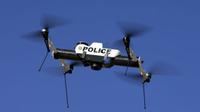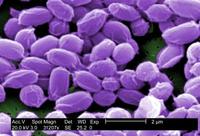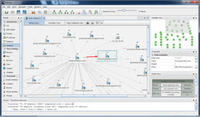-
Israeli planes destroy Sudanese arms factory suspected of producing chemical weapons for Hamas
Earlier this morning Israeli planes destroyed the Yarmouk arms factory in Khartoum, Sudan’s capital – 1,300 miles from Israel; in 1998 the plant was suspected of holding Iraqi chemical weapons which Saddam Hussein wanted to conceal from the UN inspectors; Sudan has become a major corridor of arms for Hamas, and Israel has conducted several military operations inside Sudan aiming to disrupt shipments of arms to Hamas; in April 2011 Israeli special forces, ferried by helicopters into Sudan, ambushed and killed two high-level Hamas officials who were on their way to Libya to finalize a deal, financed by Iran, to buy about 800 chemical munitions from anti-Qaddafi rebels who had taken over a couple of chemical weapons depots from the pro-Qaddafi forces
-
-
Kaspersky Lab working on a secure operating system for critical infrastructure
Antivirus firmKaspersky Lab is set to make a major contribution to the security of critical infrastructure systems by developing an operating system specifically designed for such systems; the new operating system will protect information used in infrastructure such as nuclear power plants, transportation control facilities, gas and electrical systems,and other facilities “criticallyimportant” to the economy and well-being of industrialized societies
-
-
Looming sequestration causes Navy to looking at future technology, fleet size

Adm. Mark Ferguson, vice chief of naval operations, offered a revealing look at the potential future for the Navy if sequestration, or automatic defense cuts, goes into effect in January; without some sort of adjustment by Congress, currently the subject of discussion on Capitol Hill, the nearly 10 percent across-the-board Department of Defense budget cuts are slated to commence in 2013 and continue for ten years
-
-
New high security police barracks opens in Maryland

The new $11.3 million Maryland State Police Barracks has opened up in Hagerstown, Maryland; the facility features many security measures and can serve as a command center in the event of a major emergency
-
-
As domestic use of drones grows, privacy advocates worry

Small aerial drones are moving from the battlefield to local communities, and the pace grows faster; during the next year, drones may be used in cities and towns to help fight crime and keep officers out of danger; their use would save on the cost of fuel for police helicopters; some would feel safer as a result, but activists worry that this could be the beginning of a systemic invasion of privacy
-
-
Border Patrol relies in obsolescent surveillance gear
An Obama administration plan to update equipment the Border Patrol is using did not materialize, and now officials are concerned about outdated equipment putting the lives of agents in danger; the sensors now in use were originally said to be able to put Border Patrol agents in position to capture 90 percent of border invaders, but the DHS inspector general determined that just 4 percent of the alarms were confirmed cases of smugglers and border crossers; 34 percent were false alarms, and 62 percent were undetermined
-
-
Syracuse University, city police to join forces to make area safer
The Syracuse Police Department (SPD) has agreed to join forces with Syracuse University’s Department of Public Safety (DPS) to increase the police presence on university ground and the surrounding communities
-
-
Jordan foils al Qaeda terror plot against Western embassies, shopping centers

Jordan said its security services have arrested eleven militants who have planned attacks on Western diplomatic missions, shopping malls, and other targets in the capital Amman; this was the first terror plot is to be uncovered in Jordan since an al Qaeda bombing attack on three hotels in Amman almost seven years ago killed sixty people
-
-
Twenty-year anniversary of U.S. last full-scale nuclear test
The first U.S. nuclear test, code named Trinity, took place in southern New Mexico forty-seven years earlier, on 16 July 1945; in all, the United States conducted 1,030 nuclear tests – the last one, code-named Divider, took place twenty years ago, on 23 September 1992
-
-
Hezbollah drone represents changing technological landscape for Israel
Israel’s air defenses worked just fine in handling the drone launched by Hezbollah last week: the drone was picked up by Israeli surveillance as it was launched from southern Lebanon, then tracked as it flew south over the Mediterranean; it was allowed to enter Israeli air space so that after it was shot down, its remains could be collected and analyzed; still, the incident made many Israelis sit up and take notice; Israel, a country which has pioneered the use of UAVs as an integral part of military operations and which has held a monopoly on operating drones in the region, was forced to realize that is adversaries, too, now had access to the technology
-
-
Researchers find anthrax can grow and reproduce in soil

Anthrax has the unexpected ability to grow and reproduce while lurking in soil — increasing the deadly bacteria’s chances to infect cattle and other mammals; researchers have found that the spores can attack a common soil and water amoeba, Acanthamoeba castellanii, turning these single-celled organisms into anthrax incubators
-
-
Bangladeshi national arrested for trying to blow up the Federal Reserve Bank
A 21-year-old Bangladeshi national, Quazi Mohammad Rezwanul Ahsan Nafis, was arrested by FBI agents after he attempted to detonate what he believed was a 1,000-pound bomb in front of the Federal Reserve Bank building on Liberty Street, Manhattan; the device, however, was a fake provided to him by undercover FBI agents who had been tracking his activity, the FBI’s Joint Terrorism Task Force said Wednesday afternoon
-
-
Sen. Rockefeller asks Fortune 500 CEOs for cybersecurity best practices

Last month, Senator Jay Rockefeller (D-West Virginia) sent a letter to the CEOs of fortune 500 companies asking them what cybersecurity practices they have adopted, how these practices were adopted, who developed them, and when they were developed; many saw Rockefeller’s letter as an admission that the Obama administration does not have a basis for trying to impose cybersecurity practices on the private sector through the Cybersecurity Act of 2012, now stalled in Congress
-
-
New app uses scattered public information to put together a digital footprint of individuals, organizations

A new app application can collect scattered online clues to provide a picture of individuals or organizations; the application draws on public data sources in order to put together a graphical digital footprint
-
-
New book discusses on immigration issues in Arizona
In a new book, State Out of the Union: Arizona and the Final Showdown over the American Dream, JeffBiggers that SB 1070 has changed the way people look at Arizona, and that the history of revolutionary politics in the state has been forgotten; Biggers wants people to remember the political figures of the past – for example, the liberal Morris K. Udall and the conservative Barry Goldwater — who made Arizona prominent in U.S. history and politics
-
More headlines
The long view
What Does Netflix’s Drama “Adolescence” Tell Us About Incels and the Manosphere?
While Netflix’s psychological crime drama ‘Adolescence’ is a work of fiction, its themes offer insight into the very real and troubling rise of the incel and manosphere culture online.
A Shining Star in a Contentious Legacy: Could Marty Makary Be the Saving Grace of a Divisive Presidency?
While much of the Trump administration has sparked controversy, the FDA’s consumer-first reforms may be remembered as its brightest legacy. From AI-driven drug reviews to bans on artificial dyes, the FDA’s agenda resonates with the public in ways few Trump-era policies have.
The Center Can Hold — States’ Rights and Local Privilege in a Climate of Federal Overreach
As American institutions weather the storms of executive disruption, legal ambiguity, and polarized governance, we must reexamine what it means for “the center” to hold.
How to Reverse Nation’s Declining Birth Rate
Health experts urge policies that buoy families: lower living costs, affordable childcare, help for older parents who want more kids
Foundation for U.S. Breakthroughs Feels Shakier to Researchers
With each dollar of its grants, the National Institutes of Health —the world’s largest funder of biomedical research —generates, on average, $2.56 worth of economic activity across all 50 states. NIH grants also support more than 400,000 U.S. jobs, and have been a central force in establishing the country’s dominance in medical research. Waves of funding cuts and grant terminations under the second Trump administration are a threat to the U.S. status as driver of scientific progress, and to the nation’s economy.
The True Cost of Abandoning Science
“We now face a choice: to remain at the vanguard of scientific inquiry through sound investment, or to cede our leadership and watch others answer the big questions that have confounded humanity for millennia —and reap the rewards.”
